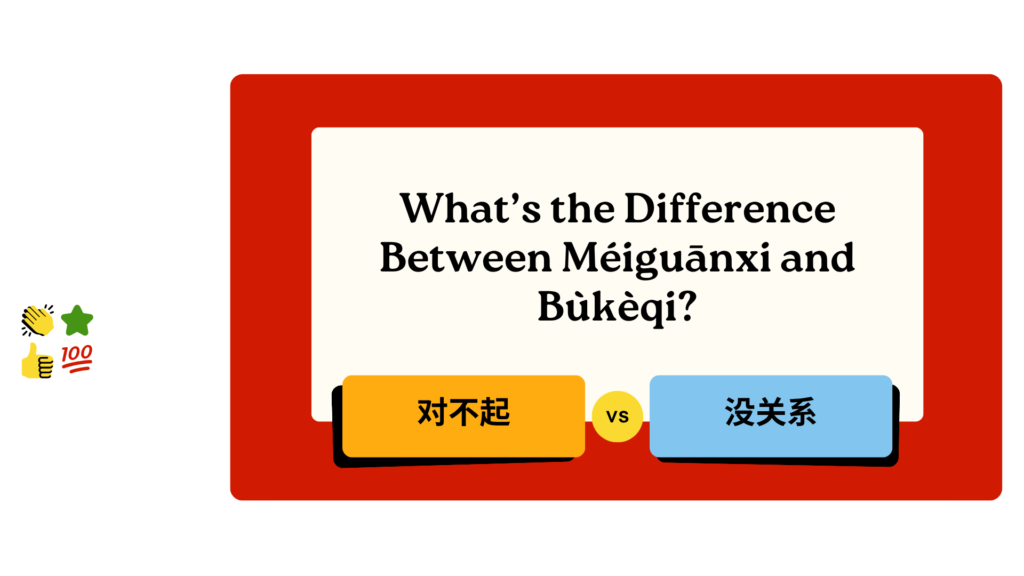Both méiguānxi (没关系) and bùkèqi (不客气) are polite expressions in Mandarin Chinese, but they serve different purposes in conversation. While méiguānxi is used to ease tension or forgive small mistakes, bùkèqi is a warm, modest response to gratitude. Though both reflect Chinese values of harmony and respect, they apply to different social contexts—one to apologies, the other to thank-yous.
What does méiguānxi (没关系) mean?
Literal meaning: “It doesn’t matter” or “no problem.”
When to use:
- In response to an apology
- When someone bumps into you or makes a small mistake
- To reassure others that you’re not upset
Example:
Person A: 对不起,我迟到了。(Duìbuqǐ, wǒ chídàole.) – Sorry I’m late.
Person B: 没关系。(Méiguānxi.) – It’s okay.
What does bùkèqi (不客气) mean?
Literal meaning: “Don’t be polite.”
When to use:
- In response to “thank you”
- To show friendliness and modesty after doing someone a favor
Example:
Person A: 谢谢你帮我。(Xièxiè nǐ bāng wǒ.) – Thank you for helping me.
Person B: 不客气。(Bùkèqi.) – You’re welcome.
What’s the difference between the two?
Key distinction:
- Méiguānxi is used when someone says sorry.
- Bùkèqi is used when someone says thank you.
They respond to different social cues:
- Apology vs. gratitude
- Reassurance vs. modesty
Can they be used interchangeably?
No. Saying méiguānxi in response to a thank you would sound awkward, and saying bùkèqi after someone apologizes would be confusing. Each phrase fits a specific type of social situation.
Are there any cultural nuances to keep in mind?
Yes.
- Méiguānxi can also convey a tolerant or easygoing attitude.
- Bùkèqi expresses humility and a willingness to help without expecting return.
Both reflect values in Chinese culture such as harmony, politeness, and emotional restraint.
Are there other polite expressions with similar meanings?
Yes, here are a few:
| Chinese Phrase | Meaning | When to Use |
|---|---|---|
| 没事 (méishì) | “It’s nothing” | Interchangeable with méiguānxi in casual settings |
| 不用谢 (bùyòng xiè) | “No need to thank me” | Alternative to bùkèqi |
| 小意思 (xiǎo yìsi) | “It’s nothing special” | Often used when giving a gift or favor |
In summary:
| Phrase | Meaning | Typical Situation |
|---|---|---|
| 没关系 | It’s okay | Responding to an apology |
| 不客气 | You’re welcome | Responding to gratitude |
By using these expressions correctly, you show not only politeness, but also cultural understanding and emotional sensitivity.
